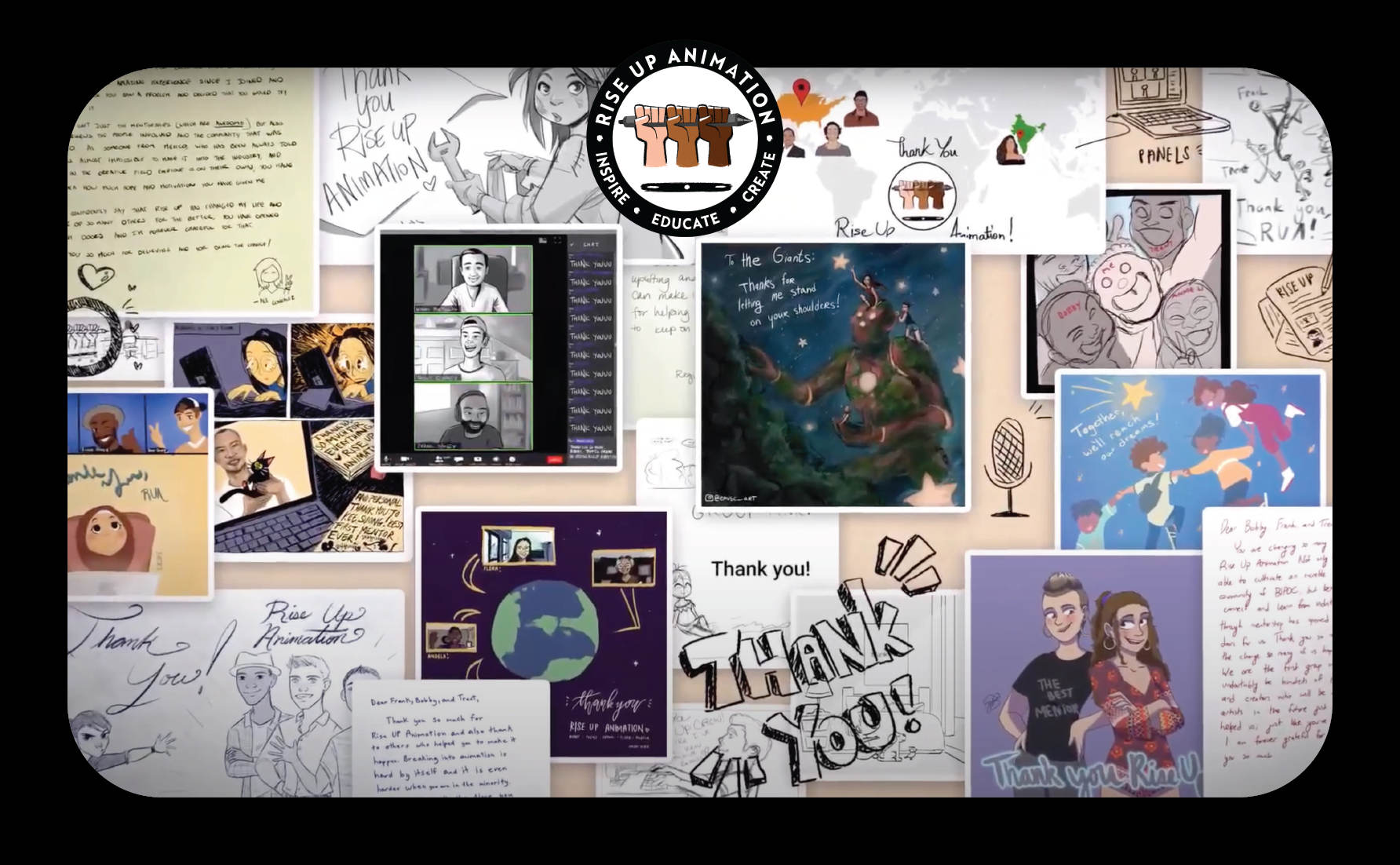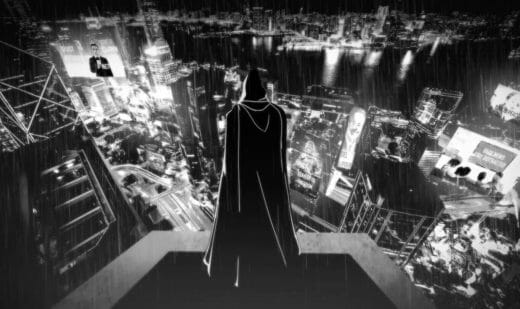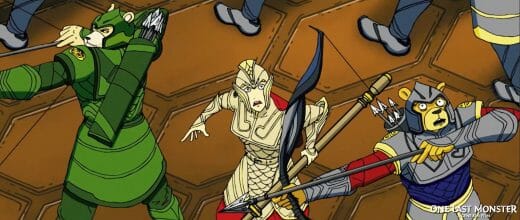
The murder of George Floyd at the hands of a police officer, caught on camera, was one of many defining moments for the Black Lives Matter movement in 2020. Communities across America and around the world gathered to protest against police brutality and to demand better from other powerful institutions, including the entertainment industry. Facing increased public scrutiny, media companies responded to criticism of underrepresentation and racial disparities, both on-screen and behind-the-scenes. This was far from the first time the entertainment industry was called to be more accountable to BIPOC creators and viewers; as previous movements, such as #OscarsSoWhite, revealed ongoing underrepresentation.
A group of friends, all animation industry professionals, were grappling with what they themselves could do to support the BLM movement in the midst of the global pandemic. “We were all donating, reaching out to friends, and taking time to educate ourselves about racism and inequality,” says Trent Correy, director and animator at Walt Disney Animation Studios. “But, we realized that the best work we could do would be within our own community.”
Trent Correy, Frank Abney, Bobby Pontillas, and Monica Lago-Kaytis began to brainstorm ideas. “We wanted to think of a way that we could really support BIPOC talent who are trying to break into the industry,” says Bobby Pontillas, director, character designer, and animator. The four friends, who came to know each other by crossing paths in the industry over the years, understood how difficult it can be to get your first industry gig.
“The animation industry has a legacy of mentorship, going back to the early days of Disney,” says Trent. “All of us have benefited from mentorship in our animation careers. Mentorship has gotten us in, but it’s also helped us grow as artists.” Trent explains that while there are plenty of animation schools, pricing presents a barrier of access. “We wanted to find a way to provide mentorship opportunities that were accessible,” he says.
The group felt that mentorship could help address the industry’s diversity problem. The presence and visibility of Black, Indigenous, and people of color (BIPOC) within the professional workforce is key to increasing on-screen representation. With BIPOC talent behind the scenes, TV shows and films can do a better job of creating narratives that reflect the lived experiences of underrepresented viewers.
BIPOC artists have long faced systemic barriers in pursuing careers in animation. A lack of mentorship opportunities is just one of those barriers. In June 2020, the organization Black ‘N Animated shared an open letter, from the US Black Animation community to the industry itself. In it, they explained the depth of the problem. They wrote:
“The Black animation community finds itself fighting for our humanity at the same time that we fight for the right to exist in our chosen profession. Audiences can plainly see this struggle in the absence of developed Black human characters in cartoons and the absence of Black professionals named in the credits of these productions. Black people have been systematically suppressed in all levels of the industry: in education, in hiring, and in promotions for leadership positions.”
By addressing accessibility to education through mentorship, Trent, Frank, Bobby, and Monica felt that they could help relieve one of the systemic barriers that BIPOC artists face. It was just a matter of how they would do it.
“That’s when we realized that we were in a unique moment. Because of the pandemic, everything was being conducted online. This meant we could easily connect with young artists around the country, and the world. And the best thing we could offer them was our mentorship,” says Monica Lago-Kaytis, producer and CEO of Frogbot Films. “We decided to put together a program that would offer free virtual portfolio reviews to BIPOC talent.” And that’s how Rise Up Animation (RUA) was born.
The four founders put out a call to their friends and colleagues across the industry, and within a week, they had 300 volunteers who’d agreed to join the initiative. Industry professionals from studios, including Pixar, Disney, Dreamworks, Netflix, Nickelodeon, Sony, Cartoon Network, came forward to offer mentorship, participate in panels, and volunteer their time. They sketched a logo, created social media accounts, and started posting.
Now, less than a year later, RUA is a registered non-profit organization with over 500 active mentors and a community of over 33,000 followers on Instagram. The organization focuses on providing free one-on-one feedback sessions. Applicants simply fill out a form in which they indicate their chosen discipline and personal details. The only qualifications are that they are over the age of 18 (or have parental guidance), and identify as BIPOC. They don’t need to have prior education or experience in animation. RUA then matches the applicant with a mentor.“From there, the mentorship experience is very individual,” says Bobby. The mentee can choose to connect with their mentor in whatever way is comfortable for them. That might be by email, phone, or video call. They spend anywhere from 30 minutes to one hour with their mentor. During the session they might look at the mentee’s artwork, resume or they might just share stories. It’s up to the mentee to decide what they’d like to gain from the session.
Following the session, the mentor can choose to continue mentoring that mentee and the mentee is free to sign up for another feedback session 60 days later. These virtual feedback sessions give mentees around the world a glimpse into the animation industry that they wouldn’t be able to access without travelling to Hollywood.
“Unfortunately, most of the mentors we have available at RUA aren’t BIPOC. This actually reinforces how important mentorship for BIPOC talent is. The fact that most of our mentors are white demonstrates the need for diversity and inclusion in the industry,” says Monica. That’s where panels come in. Aside from feedback sessions, RUA provides weekly panels that highlight BIPOC animation professionals and provide resources and tips.
“The panels are about showing up-and-coming BIPOC talent that there are people who look like you in the field,” says Trent. Seeing diverse representation is incredibly important when working toward equity in any field. A recent working paper published in the The National Bureau of Economic Research shows that having just one Black teacher not only lowers high school dropout rates for Black students but also increases their likeliness to enroll in college. Similarly, by hosting panels led by BIPOC artists, RUA provides their mentees assurance that they do belong in the animation industry.
One of those mentees is Kylie Gay. She attended the Savannah College of Art and Design, where she earned a major in animation. Kylie had graduated from school and started applying for jobs, but kept receiving rejection letters. She signed up for every career and animation webinar she could find, but says, “You can only get so much out of a webinar. They can tell you what to put in your portfolio, but really you need someone to take a look and help you understand why what you’ve got isn’t working.”
Because there’s barely any animation presence in Florida, where Kylie lives, it felt to her as though the animation industry was worlds away. “I started to feel as though a career in animation wasn’t in the cards for me, and I’d begun to think about what my other career options might be.”
That’s when she discovered RUA. “I found RUA within an hour of their first Instagram post,” she says. She attended the panels, got connected with her mentor, and had her first feedback session. Kylie explains that the mentorship was incredibly helpful, but that she also found strength in the community. At the time Kylie had no one to talk to about her career frustrations because all of her friends had found jobs.
The RUA community offered a safe space for support. She joined the RUA Discord channel where she was able to connect with other BIPOC artists who could relate to her frustrations. They shared resources, reviewed each other’s art, and had honest discussions about things like mental health. “This support helped me to muster up the confidence to keep at it, to keep submitting my work,” Kylie says.
RUA is meaningful for the mentors as well. “As mentors, we understand the frustration of searching for a job. We know how tough it is to break into the animation industry, especially for BIPOC artists,” says Bobby. So talking with mentees who are sometimes on the brink of giving up can be emotional. Bobby explains that as mentors they can provide practical guidance, but emotional support as well. “It’s our job to encourage mentees not to give up,” he says.
Monica explains that RUA wishes they could guarantee every mentee a job. Mentors will always do their best to get portfolios in front of the right people, “but we can’t promise jobs,” she says. “What we can promise is to give the support and confidence that mentees need to keep applying.”
For Kylie, the big break came without an application. In the late fall, Disney Television Animation reached out directly to Kylie — a member of their art department had seen her work on Instagram. Within a month, she had an official job offer. “I had to read it several times just to absorb that the offer was real,” Kylie laughs. Now, a few months later, she says the job is going well. Currently, she’s a storyboard revisionist, but in the future she has dreams of making her own movie.
When Kylie landed her job, the news spread across RUA’s channels. Trent says that when he heard about it, it felt like a victory. Not just for Kylie, but for the whole RUA community. And for Trent, Frank, Bobby, and Monica, the founders of RUA, victories like Kylie’s represent the ethos of their organization. “The name ‘Rise Up Animation’ was about capturing this idea of raising BIPOC up,” Bobby explains. “We want to give BIPOC artists tools, knowledge, and community. We want them to see themselves represented in the animation. And we want to raise them up to be an active part of this industry.”



